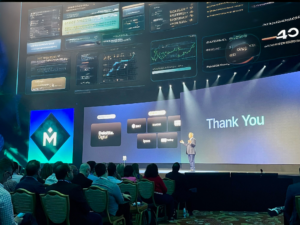Medallia’s Experience 2025 conference in Las Vegas started off with an unusual CEO keynote: Mark Bishof, only three months into the role, kicked off the event with what amounted to a corporate mea culpa. Bishof said that Medallia’s customers were feeling a lack of innovation, a lack of visibility, and a lack of leadership engagement; he and his new leadership team (almost all new executives from top to bottom) have already started the work to changing all those impressions. It was a truly striking opening note for a company with its roots in consumer survey tech but which has expanded into contact center apps, conversation intelligence, and employee experience tools. In fact, continuing that evolution was the significant theme of the whole event: Medallia is moving from surveys and signals to conversation and automation and is moving to rapidly accelerate the data to insights to action loop.
One of the key changes that Medallia demonstrated: greatly expanding its remit to include the world of unstructured data. Bishof claimed that only 10% of the data out there customers could be using is structured, mainly in the form of surveys. That leaves 90% made of unstructured data types. As Bishof put it, “we are not abandoning surveys. But we need to pivot from it and build on it.” While surveys remain foundational, they often fail to capture the full picture of customer sentiment. Medallia’s vision involves integrating omnichannel insights—spanning digital behavior, chat logs, call transcripts, reviews, operational data, and more—to create a holistic view of the customer journey.
Building on the structured data base, but incorporating unstructured data sees Medallia expanding into new features like:
- Smart response
- Digital session summarization
- Root cause assist
- Coaching intelligence
- Prescriptive digital experience intelligence
- Intelligent summaries
While each of these new areas can provide some value to contact center and sales leaders, the coaching intelligence features are the most intriguing. Vendors have rushed to offer AI-powered augmentation tools to contact center agents and inside sales reps. Seemingly every CCaaS, CRM, and conversation intelligence and analytics vendor has some offer in that space. But, as we’ve pointed out before, contact center agents are both typically paid low salaries and suffer from very high turnover, while the rest of the staff in the contact center are better paid and make up a more stable workforce. So, Medallia’s focus on contact center team leads, supervisors, and coaches makes a great deal of sense.
The goal is simplified preparation for supervisors for their one-to-one coaching sessions, leading to smoother and more actionable coaching. The tool provides genAI-created summaries of previous coaching sessions, allowing supervisors to quickly find their place in the agent’s skills and career development. Then there is a button called Help Me Coach which generates ideas for new coaching topics and activities based on the agent’s recent performance. With a single click, those ideas can be added to the coaching agenda that is shared with the agent. It is an elegant system with low cognitive load for both the supervisor and the agent.
Two other quick notes from the event:
- New Chief Product Officer Fabrice Martin promised a move away from just dashboards to many more conversational interfaces. This will allow leaders to more easily and directly interrogate the data and insights that Medallia generates. Combine that design initiative with Bishof’s promise of greatly increased self-service capabilities for customers, and it becomes clear that Medallia wants to expand both which type of companies it serves and the number of people in those organizations capable of benefiting from its technology.
- Opus Research always love it when someone’s offhanded comment gets our brain gears whirring. That happened during an excellent breakout session on orchestrating cross-channel experiences. In that session, one of Medallia’s CX advisors made a simple, but profound point: making one customer’s experience better might also improve other customers’ experiences. The advisor used an example in the physical world: in a sports stadium with very long lines at its food venues, an app-based express drinks-only line not only allows people wanting just drinks to have a smoother experience, but it also reduces the line length for people getting food, giving them a better experience, as well
Applying that idea to the world of customer service could have large implications for how brands view the ROI of their investments. For example, when brands invest in conversational AI or voice AI, they typically measure the return based on the impact to the customers actually using the technology—calls contained within self-service. But if brands reframe the self-service technology as an “express channel” for simple requests, then, like the sports stadium example, creating dedicated channels for quick, straightforward customer needs (e.g., FAQs or order tracking) can improve overall service efficiency. Viewed this way, implementing a chatbot or voice AI for common inquiries reduces wait times for customers with more complex issues, enhancing satisfaction across all users.
Categories: Conversational Intelligence, Articles


 Getting It Right: What AI Agents Actually Mean for Customer Support (Webinar)
Getting It Right: What AI Agents Actually Mean for Customer Support (Webinar)  Beyond the Basics: How AI Is Transforming B2B Sales at TP
Beyond the Basics: How AI Is Transforming B2B Sales at TP  Five9 Launches Agentic CX: Toward AI Agents That Reason and Act
Five9 Launches Agentic CX: Toward AI Agents That Reason and Act  2025 Conversational AI Intelliview: Decision-Makers Guide to Self-Service & Enterprise Intelligent Assistants
2025 Conversational AI Intelliview: Decision-Makers Guide to Self-Service & Enterprise Intelligent Assistants